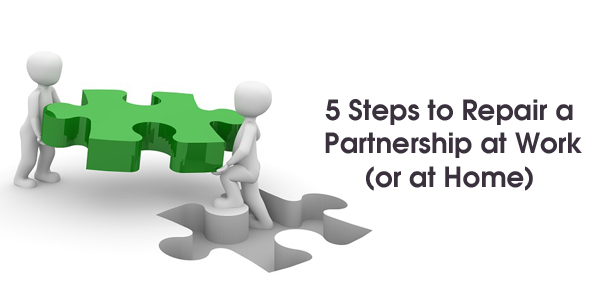Caveat emptor: Be honest with yourself and answer, “How important is it for you to be right and/or get your way in a partnership conflict vs. make the relationship better between you?”
A way to know your answer is how long you act negative, angry and/or sullen after you’ve been wrong or not gotten your way.
The longer you act those ways, the more important it is for you to be right and/or get your way, and what follows will not work for you. And by the way, you’re not very good partnership material at work or at home.
The 5 steps to repairing a partnership
- Tell your partner, “I would like to try something that could resolve a conflict between us and may even repair our relationship going forward, and I’d like to know if you’re willing to give it a try.” Be forewarned that they may reject it initially because you have surprised them and caught them off guard. If they do, say: “I understand that I caught you off guard, and your response right now is ‘no,’ but the offer is still open going forward, should you want to give it a try.”
- Then say, “Tell me in detail about several times in our partnership when I have most frustrated, angered and disappointed you and why, and I promise to not become defensive or get into an argument with you about them.”
- Then say, “What did you most want to do when those events happened? And why?”
- Then say, “What did you end up doing when those events happened? And why?”
- Then say, “What should we do starting now so that you and I never need to go through any of those again, and although I may not fully go along with it, what can I do now that would help make it right between us so we can move forward? And why that?”
There is a saying that you have more control over what you say than how it is heard. In the current scenario, you have no control over how the other person will hear what you say or how they react and respond to you. Therefore, don’t get attached to whatever their reaction is.
The good news, however, is that regardless of their reaction, you may leave the conversation thinking to yourself, “I can’t be any more gracious than that” and there is a good chance that you’ll feel good about yourself regardless of what they say or do.
An unforgiving attitude hurts partnerships
Circling back to the opening caveat emptor, if you have read through the five steps and are unable or unwilling to try them, there is a chance that you not only have too much of a need to be right and/or get your way, but that you also have an unforgiving attitude.
